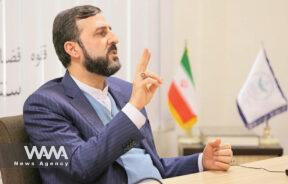Araghchi to Europe: Either Play the Game or Just Watch from Muscat
WANA (Apr 25) – As the third round of indirect Iran-U.S. negotiations begins in Muscat, accompanied by the first round of expert-level talks, Iran has once again called on Europe to return to diplomacy. Foreign Minister Abbas Araghchi’s invitation to France, Germany, and the UK presents a test for redefining Europe’s role in the evolving regional security architecture.
Europe’s Last Chance to Return to Diplomacy
On the eve of the third round of indirect political talks between Iran and the United States in Muscat—held in parallel with the expert-level negotiations—the regional and international diplomatic scene has entered a new phase. With unusual clarity, Araghchi has urged European capitals to reengage with the diplomatic path.
While this invitation reflects Tehran’s strategic rationality, it also sets a high-stakes challenge for the European trio. This move comes at a time when Iran-Europe relations have hit their lowest point in over a decade, benefiting neither side. The coincidence of this diplomatic initiative with the Muscat negotiations raises serious questions about Europe’s relevance in the emerging regional and global equations.
Europe’s Deadlock: Choosing Inaction Over Initiative
In recent years, the European trio has largely adopted a posture of inaction, psychological pressure, and a lack of independent decision-making. Araghchi rightly notes that the current bilateral relationship is stuck in a “lose-lose” dynamic. Despite its diplomatic rhetoric, Europe has neither acted as an effective mediator nor offered any meaningful initiative to de-escalate tensions. Even when Iran has signaled readiness for negotiations, European countries have often backed off citing human rights or security concerns—or have simply aligned their positions with Washington.
This passivity has become a source of Europe’s own strategic marginalization, especially now that Muscat has emerged as the new hub of nuclear diplomacy, with China and Russia expanding their roles as mediators and guarantors.
Muscat Talks: A Chance for Europe to Redefine Its Role
Though the indirect talks between Iran and the U.S. have not yet produced concrete outcomes, they carry a clear message: Tehran no longer sees Europe as a credible intermediary. This shift in Iran’s diplomatic strategy should ring alarm bells in Paris, Berlin, and London. If Europe fails to reassert itself in the new framework, it will inevitably be sidelined.
Just yesterday, the French Foreign Ministry spokesperson declared Paris’s readiness for dialogue with Iran—but without real political will for a change in course, such statements seem more like media posturing than serious intent. Araghchi has made it clear that he is willing to visit Paris, Berlin, or London—but it is the Europeans who have chosen a hard and fruitless path.
The real question now is whether Europe is ready to accept Iran’s invitation and return to genuine negotiations, or if it will remain stuck in its past.
Europe at a Defining Crossroads
Europe stands at a historic crossroads: one path leads to responsible diplomacy, the other to continued marginalization in West Asia’s security developments.
Araghchi’s message is more than a diplomatic gesture—it is a strategic warning: if Europe wants to remain a player, it must go beyond symbolic positions and take real action. Muscat may be the venue for talks with Washington, but Paris, Berlin, and London still have the opportunity to break free from passivity and shape the future of regional security.












